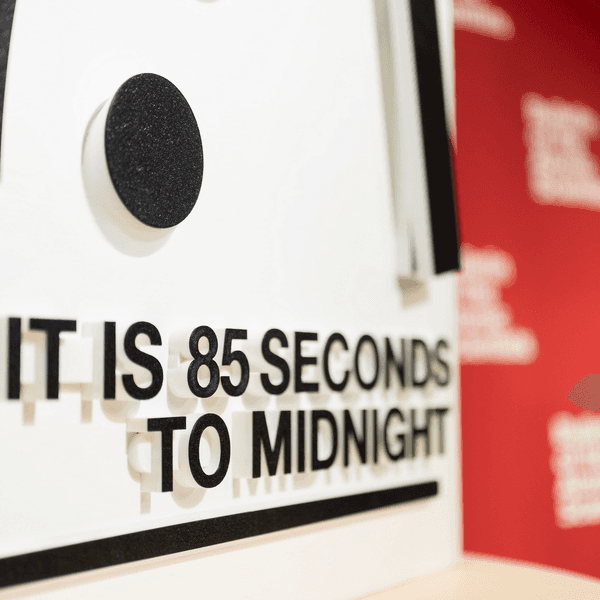Incoming! Incoming!
Uh . . . pardon me while I interrupt this false alarm to quote Martin Luther King:
"Science investigates," he says in The Strength To Love, "religion interprets. Science gives man knowledge, which is power; religion gives man wisdom, which is control. Science deals mainly with facts; religion deals mainly with values. The two are not rivals."
These words stopped me in my tracks on MLK Day. They seemed to fill a hole in the breaking news, which never quite manages to balance power with wisdom, or even acknowledge the distinction.
Our relationship to power is unquestioned, e.g.: "In the United States itself, there are around [nuclear] 4,500 warheads, of which approximately 1,740 are deployed," Karthika Sasikumar writes at the Bulletin of the Atomic Scientists. "Even more worrying, around 900 of these are on hair-trigger alert, which means that they could be launched within 10 minutes of receiving a warning (which could turn out to be a false alarm). . . .
"The threat to the United States is very real, but fattening the nuclear arsenal is not a rational response. The United States already has 100 times as many warheads as North Korea. . . ."
The U.S. has enormous power, but so what? Such data is almost never addressed in the mainstream media -- certainly not in the context of . . . disarmament. That concept is sealed shut, barred from the consciousness of generals and news anchors. Certainly it didn't come up in the coverage of what happened last Saturday in Hawaii, when an employee of the Hawaii Emergency Management Agency hit the wrong link on his computer screen during a shift change and an incoming-missile alert went statewide, throwing residents and tourists into 38 minutes of panic: "Children going down manholes, stores closing their doors to those seeking shelter and cars driving at high speeds . . ."
Nor did it come up three days later, when a false missile alert went off in Japan, a country with a few memories of the real thing: "Within 10 seconds the fire that wiped out the city came after us at full speed. Everyone was naked. Bodies were swelling up. Some people were so deformed I couldn't tell if they were male or female. People died screaming, 'Please give me water!'"
So said Emiko Okada, who was a little girl living with her family on the outskirts of Hiroshima on Aug. 6, 1945. Her older sister, who had just left for school, disappeared that morning and was never seen again. Emiko tells her story in the remarkable 2010 documentary Atomic Mom.
In a column I wrote about the movie at the time, I asked: "What if schoolchildren stood facing not the American flag every morning before class started but a photograph of a devastated Hiroshima, shortly after it was obliterated by our atomic bomb, and pledged their allegiance to the idea that such a thing will never happen again?"
What, I wondered, if we started facing our fears instead of living in fear? To do so, we have to find wisdom in the maw of power.
What we find instead is a president who shook up the whole planet when he called Haiti and the countries of Africa shithole nations -- managing, as far as I can tell, to make the word "shithole" far more acceptable to utter in public than "disarmament."
But the monstrousness of the word isn't that it used to be obscene, but rather that it does what so many other words do: renders a segment of humanity soulless: the enemy, and therefore expendable. Japan is now our ally, but when we nuked Hiroshima and Nagasaki, its people were Japs or Nips and without value.
Is not the first step toward wisdom when it comes to a world still preposterously armed with weapons of mass destruction a national and international commitment never to dehumanize a living soul? With such a commitment in place, the obvious next step is committing never to launch a nuclear weapon, and therefore agreeing to get rid of the ones we have and, of course, refraining from developing new, more "usable" generations of nukes.
To put it another way, mutually assured destruction is not wisdom. It's playing with global holocaust, an outcome that may be beyond the ability of anyone, at least anyone who is not a hibakusha -- an atomic bomb survivor -- to imagine. Free of such paralyzing awareness, national leaders postulate how they would retaliate if attacked, as though a counterattack, killing millions more people, is in any way a sane response to a nuclear attack (or apparent attack).
The Atlantic, in an article about the Hawaii false alarm, quoted one scholar's tweet of a possible scenario: "POTUS sees alert on his phone about an incoming toward Hawaii, pulls out the biscuit, turns to his military aide with the football and issues a valid and authentic order to launch nuclear weapons at North Korea. Think it can't happen?"
Come on. With this president?
I think it's time to free MLK from his day of honor and put him back at the center of the national news.




